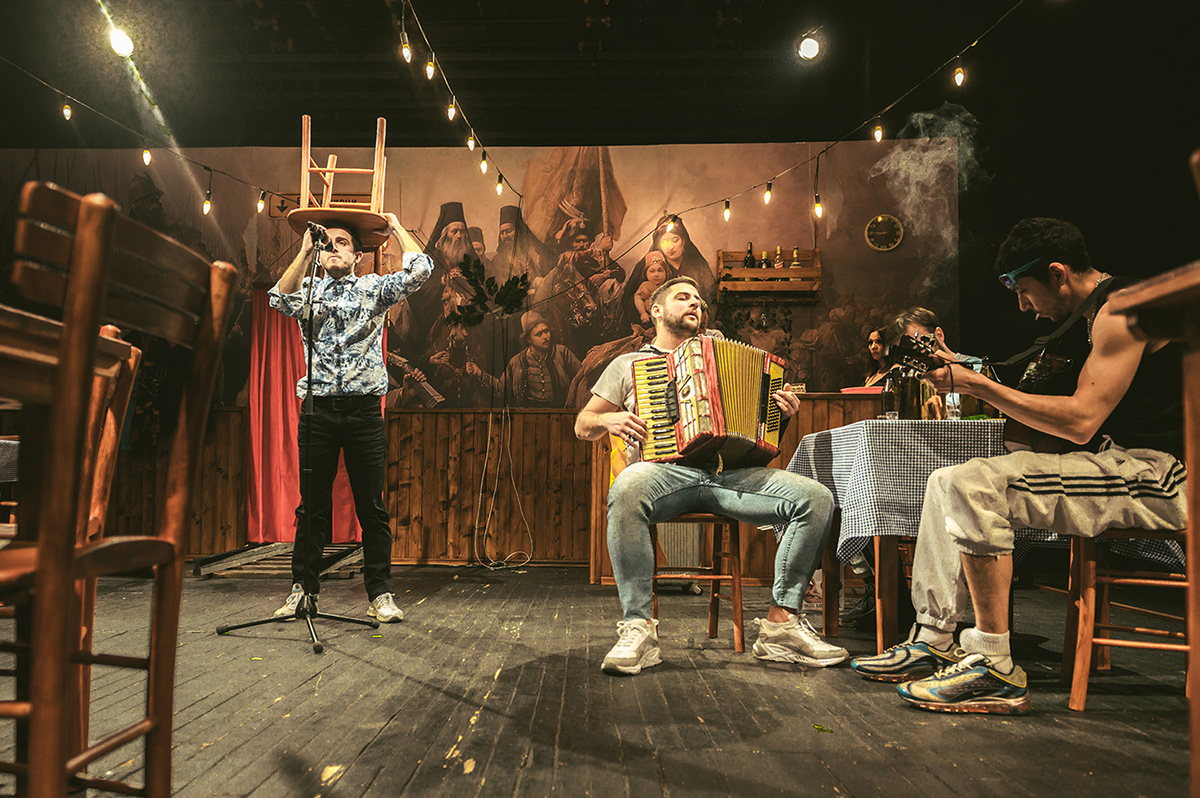Director
Text
Dramaturge
Set design
Costume design
Choreography
Music
Oct 12 / 5 and 8:30 pm / Princely Serbian Theatre
chamber play
Production: National Theatre Niš / Serbia
Duration: 90 min
Photography: Nikola Milosavljević
In the performance, Šaban Šaulić’s songs are being performed.
About the performance:
Three days in a village tavern. A group of friends who idolize Šaban Šaulić. One girl, one mother, one sister and some more family members. One cowherd with no cows and another who is the main villain in the village. They are there minding their own business. They had performed no heroic deeds nor contemplated relevant thoughts to qualify to be the heroes of the drama. They do not belong to a conventional civic theatre. Not them, not the music they love, not the dreams that some of them may not have had.
A Dream of Homeland is actually the subtitle of Ivan Velisavljević's drama Stop by, Said the Man. The subtitle became the title of our play A Dream of Homeland, not only because the fact that in few words it encompasses a series of universally recognizable emotions and that in this syntagm the muddy streets of the homeland are illuminated by the deceptive lights of nostalgia (and we know that the dream of homeland is always bigger and more beautiful than the homeland itself) but also because, not only formally, it has very explicitly directed us to everything that is under and below, through that small basement window that the playwright has opened.
Constantine Cole Vitas, a returnee from Ithaca, New York, seeing his own reflection in a window pane noticed that the face he saw in the glass was not his own, "but the face of a thin man with small eyes, freshly shaven, a man I would pass on the street trying to not to brush shoulders with him."
All the characters in A Dream of Homeland are the ones we would pass by on the street, trying not to brush shoulders with them. And they do not object to it. What’s more, unlike Constantine Vitas, they are not even aware of it.
Constantine, the one who got farther than the rest, to Ithaca in America and from there back to his Ithaca, returned without exciting stories about nymphs, cyclops and monsters, he returned to his homeland carrying with him the dream of that homeland. From Ithaca to Ithaca, in search of identity, origin and meaning. These others, who never set foot outside their own village, even without reading Homer know that the road from Ithaca leads back to Ithaca, and that the circle begins where it ends. They contemplate the transience of life through the songs of their idol.
They are not better or prettier than they are, nor do they try to be. Life has not been easy on them, although it cannot be said that they have done much in life. Most of them are crippled, but it is not something they would be ashamed of. They are what they are. Even when they become the protagonists of the drama. Each of their fates can be turned into a Šaban Šaulić song. Unless those songs were based on their lives. Where nothing is possible, everything is possible.
There is a village and in it a group of friends who idoloze Šaban Šaulić.
And their pain, and their sorrow and joy and love, are more honest than the emotions that an urbane, conventional theatre can handle.
Author team of the performance
AUTHOR`S FOREWORD
Ever since I wrote A Dream of Homeland, death has taken away a lot of what that piece is based on: many American dreams, some Serbian villages, and even Šaban Šaulić himself, the king of folk music. Šaban Šaulić was buried in the Alley of Distinguished Citizens, which was unimaginable at the time when this play takes place. Even in our theatres it has become common to explore villages, small towns and the influence of folk music, although the Krležian dramaturgy, the influence of alternative and underground movements on themes and characters, as well as the visual heritage of expressionism in directing - which
are all influences on my piece – have remained, unfortunately, quite rare. That`s why today when I watch A Dream of Homeland brought to life in the theatre, it takes on a completely different meaning. The issues of villages, returning to the homeland and disability have become even more difficult and relevant in a
country with a high mortality rate, with an aging and emigrating population (as as the case in other countries of Eastern Europe and of the former Yugoslavia). The desire for violence and the colonization of consciousness under the influence of the American empire have become an immense source of internal
unrest, which has reached us in an almost literal sense. The pathos of Šaban Šaulić`s dramatic music now sounds to me less like a counterpoint - an elegiac song at the moment of farcical disintegration, first and foremost of the protagonist Constantine Vitas and of his dreams and delusions - and more like a
requiem that a larger-than-life voice sings to a civilization, but this time from the other side of heaven. A nightmare which one could still wake up from, has turned into a waking nightmare. What theatre can do about that, and why we need it, Im not sure anymore, but Im glad that were gathering here on the occasion of my text, so we can all collectively look for an answer.
Ivan Velisavljević



